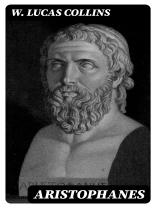In 'Aristophanes, ’ W. Lucas Collins meticulously explores the works and impact of the ancient Greek playwright, situating him within the broader literary and political landscape of Classical Athens. Collins adopts a rigorous critical approach, blending detailed analysis with historical context, to illuminate Aristophanes’ use of comedy as a vehicle for social commentary. The book delves into key plays, examining stylistic elements such as satire, wordplay, and the genre’s unique ability to confront societal norms. This scholarly work not only contextualizes Aristophanes’ artistry but also highlights his relevance in contemporary discourse on freedom of speech and political satire. W. Lucas Collins, a distinguished classicist, has dedicated his academic career to the study of ancient Greek literature and culture. His extensive research on Greek drama and philosophy provides him with a unique lens through which he views Aristophanes, allowing for insights that resonate with both scholars and casual readers alike. Collins’ blend of erudition and engaging prose reflects his passion for making classical literature accessible to modern audiences, showcasing the enduring appeal of these ancient works. This book is essential reading for anyone interested in the interplay between art and society, particularly those who appreciate the nuances of humor in literature. Collins’ exploration not only enriches our understanding of Aristophanes but also encourages readers to reflect on the role of satire in their own cultural contexts.
O autorze
W. Lucas Collins, a scholar of Classical antiquity and literature, is known for his contributions in the study and translation of ancient Greek texts. His noteworthy book 'Aristophanes’ reflects his deep engagement with the eponymous playwright’s works, providing readers with valuable insight into the comedic genius of ancient Athens. Collins’ scholarly efforts bridge the gap between modern readers and the complex world of Old Attic comedy, delivering not just translations but also critical analyses that illuminate the social, political, and literary context of Aristophanes’ plays. In his book, he elucidates the intrinsic humor and the enduring relevance of the themes tackled by Aristophanes, which ranged from political satire to social commentary. His literary style combines academic rigor with accessibility, allowing both scholars and casual readers to appreciate the wit and wisdom of one of Greece’s greatest playwrights. Collins’ work is marked by meticulous research, a clear understanding of Greek literature, and an ability to interpret ancient texts in a way that resonates with contemporary audiences. His contribution to the field of Classical studies continues to be a valuable resource for those interested in exploring the rich heritage of Greek literature and its enduring influence on Western culture.












